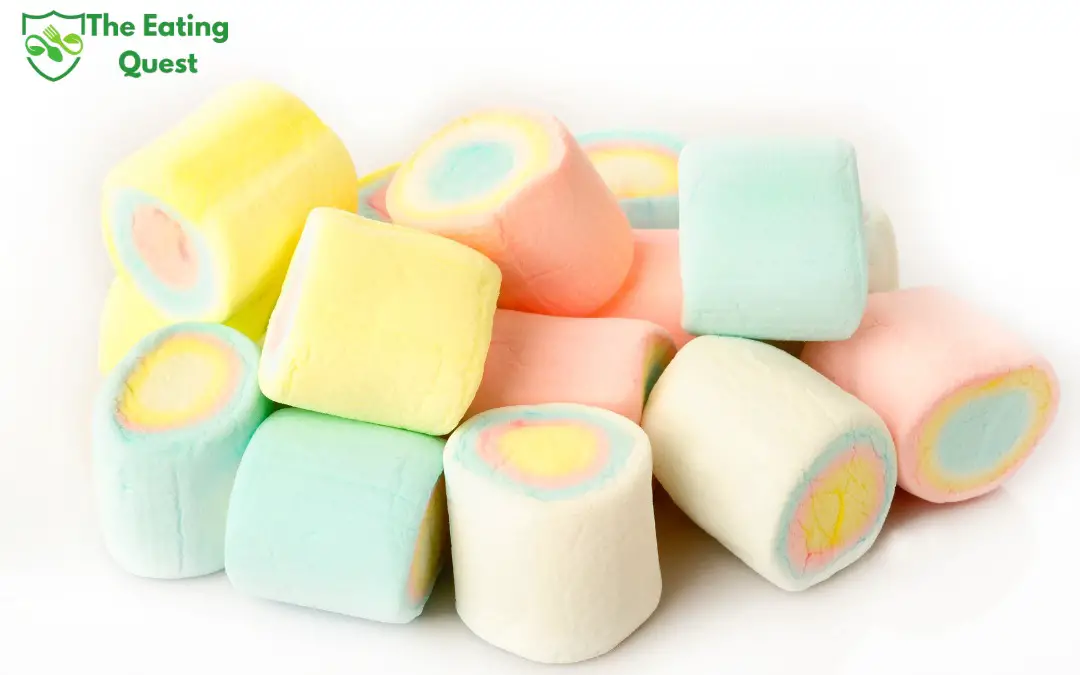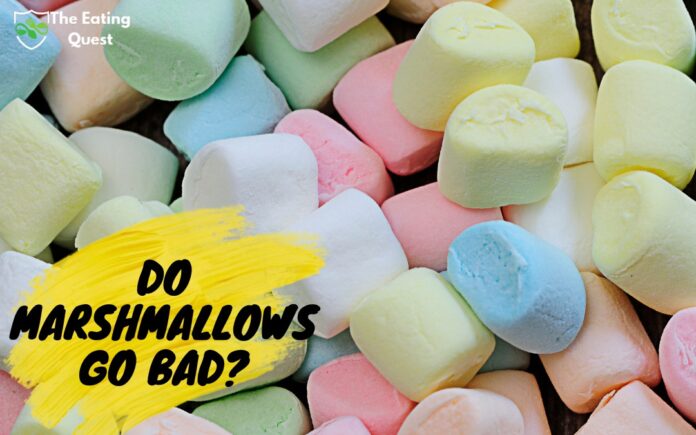Marshmallows are a beloved treat for many people, whether enjoyed on their own or used in various recipes. However, like all food items, marshmallows can go bad over time. This raises the question: do marshmallows go bad, and if so, how can you tell?
Marshmallows are typically made from sugar, corn syrup, gelatin, and water, with additional flavorings and colors added as desired. While these ingredients are shelf-stable, marshmallows can still go bad due to their high sugar content. Over time, the sugar in the marshmallows can begin to crystallize, causing them to become hard and lose their soft, fluffy texture. Additionally, marshmallows can absorb moisture from the air, which can cause them to become sticky and stale.
So, how can you tell if your marshmallows have gone bad? One of the most obvious signs is a change in texture. If your marshmallows have become hard and crunchy, or sticky and slimy, they have likely gone bad. You may also notice a change in color or smell, indicating that the marshmallows have spoiled. It’s important to note that while marshmallows can go bad, they are not typically a high-risk food for causing foodborne illness, so consuming a slightly stale marshmallow is unlikely to make you sick.
Do Marshmallows Go Bad?
Marshmallows are a popular treat enjoyed by many people worldwide. They are a sweet, fluffy, and chewy confectionery that can be eaten on their own or used as an ingredient in various recipes. However, like all food items, marshmallows have a shelf life and can go bad if not stored properly.
Marshmallows have a high sugar content, which acts as a natural preservative. This means that they have a long shelf life and can last for several months if stored correctly. However, marshmallows can still go bad if exposed to certain conditions.
One of the main factors that can cause marshmallows to go bad is moisture. Marshmallows can absorb moisture from the air, which can cause them to become sticky and lose their shape. This can also lead to the growth of mold, which can make the marshmallows unsafe to eat.
Another factor that can cause marshmallows to go bad is exposure to heat. Marshmallows can melt when exposed to high temperatures, which can cause them to lose their shape and texture. This can also make them more susceptible to spoilage, as the melted sugar can provide a breeding ground for bacteria.
To ensure that marshmallows stay fresh and last as long as possible, it is important to store them in a cool, dry place. They should be kept in an airtight container to prevent moisture from getting in. Marshmallows should also be kept away from heat sources, such as direct sunlight or a hot stove.
In conclusion, marshmallows can go bad if not stored properly. Moisture and heat are the main factors that can cause them to spoil. To keep marshmallows fresh and tasty, they should be stored in a cool, dry place and kept away from heat and moisture. By following these simple guidelines, marshmallows can be enjoyed for months to come.
Can You Freeze Marshmallows?
Marshmallows are a popular treat that can be enjoyed in various ways, such as roasting over a campfire, adding to hot chocolate, or using as a topping for desserts. However, sometimes you may end up with more marshmallows than you can consume before they go stale. In such cases, freezing them may seem like a good option. But can you freeze marshmallows?
Yes, you can freeze marshmallows. Freezing marshmallows is a simple and effective way to extend their shelf life. Marshmallows have a low moisture content, which makes them less susceptible to freezer burn. Freezer burn occurs when frozen food is exposed to air, causing it to dry out and develop a tough, leathery texture. However, it is still important to store marshmallows properly to prevent them from getting freezer burn.
To freeze marshmallows, you can simply place them in an airtight container or a freezer bag. Make sure to remove as much air as possible to prevent freezer burn. You can also wrap them in plastic wrap or aluminum foil before placing them in a container or bag. Label the container or bag with the date of freezing to keep track of their freshness.
When you are ready to use frozen marshmallows, it is best to thaw them at room temperature for a few hours before using. Avoid thawing them in the microwave or in hot water, as this can cause them to melt and lose their shape.
In summary, marshmallows can be frozen to extend their shelf life. To freeze them, place them in an airtight container or freezer bag, remove as much air as possible, and label with the date of freezing. Thaw frozen marshmallows at room temperature before using.
How Long Do Marshmallows Last?
Marshmallows are a popular confectionery item that is enjoyed by people of all ages. They are used in various recipes, from s’mores to hot chocolate. However, like any other food item, marshmallows also have a shelf life. In this section, we will discuss how long marshmallows last and the factors that affect their shelf life.
The shelf life of marshmallows depends on various factors like the storage conditions, the type of marshmallows, and the ingredients used. Generally, marshmallows have a shelf life of 6-8 months from the date of manufacture. However, this shelf life can be extended or shortened based on the storage conditions.
If marshmallows are stored in a cool, dry place, away from direct sunlight and moisture, they can last for up to a year. On the other hand, if they are exposed to heat and humidity, they can go bad much faster. Marshmallows that have been opened and not stored properly can also go stale quickly.
The type of marshmallows also affects their shelf life. Homemade marshmallows, for example, do not last as long as store-bought marshmallows because they do not contain preservatives. Flavored marshmallows also tend to have a shorter shelf life than plain marshmallows because the added ingredients can increase the risk of spoilage.
To summarize, marshmallows have a shelf life of 6-8 months from the date of manufacture. However, this shelf life can be extended or shortened based on the storage conditions and the type of marshmallows. It is best to store marshmallows in a cool, dry place, away from direct sunlight and moisture, to ensure that they last as long as possible.
Are Marshmallows Bad for You?
Marshmallows are a popular treat that can be enjoyed in many ways, from roasting them over a campfire to adding them to hot cocoa. However, some people may wonder if marshmallows are bad for their health.
One concern is the high sugar content in marshmallows. According to the USDA, a serving size of 4 regular marshmallows contains 14 grams of sugar. Consuming too much sugar can lead to health problems such as weight gain, diabetes, and tooth decay. It is important to consume marshmallows in moderation as part of a balanced diet.
Another concern is the use of artificial ingredients in some marshmallows. Some brands may contain high fructose corn syrup, artificial flavors, and colors. These ingredients may have negative health effects and should be avoided when possible. It is recommended to choose marshmallows made with natural ingredients.
Additionally, some people may have allergies to certain ingredients in marshmallows, such as gelatin. Gelatin is a common ingredient in marshmallows and is derived from animal collagen. People with vegetarian or vegan diets may want to choose marshmallows made with alternative ingredients such as agar agar or carrageenan.
In conclusion, marshmallows can be enjoyed as a treat in moderation. It is important to choose marshmallows made with natural ingredients and to be aware of any allergies or dietary restrictions.

How to Keep Marshmallows Fresh
Marshmallows are a delicious treat that can be enjoyed in many different ways. Whether you like them in hot cocoa, roasted over a fire, or straight out of the bag, it’s important to keep them fresh so they taste their best. Here are some tips on how to keep marshmallows fresh:
Store Them Properly
Marshmallows should be stored in an airtight container to prevent them from drying out. This will help them stay soft and fluffy for longer. You can use a plastic container with a tight-fitting lid or a resealable plastic bag. Make sure to remove as much air as possible before sealing the container or bag.
Keep Them Cool and Dry
Marshmallows should be stored in a cool, dry place. Heat and humidity can cause them to melt or become sticky. Avoid storing them in the refrigerator or freezer, as this can cause them to become hard and lose their texture. Instead, store them in a pantry or cupboard away from direct sunlight.
Use Them Before They Expire
Marshmallows have a relatively long shelf life, but they can still go bad over time. Check the expiration date on the package and use them before they expire. If you notice any signs of spoilage, such as a strange smell or mold, discard them immediately.
Don’t Mix Flavors
If you have multiple flavors of marshmallows, it’s best to store them separately. Mixing flavors can cause them to absorb each other’s scents and flavors, which can be unpleasant. Keep them in separate containers or bags to preserve their individual flavors.
By following these tips, you can keep your marshmallows fresh and delicious for longer. Enjoy them in your favorite recipes or as a sweet snack any time of day.
Can You Eat Expired Marshmallows?
Marshmallows are a popular treat that can be enjoyed in various ways, such as toasted over a campfire, used as a topping for hot chocolate, or mixed into desserts. However, like most food items, marshmallows also have a shelf life, and it’s important to know whether or not they can be consumed after their expiration date.
When marshmallows are past their expiration date, they may become stale, hard, or discolored. However, this doesn’t necessarily mean that they are unsafe to eat. Marshmallows are made primarily of sugar, gelatin, and corn syrup, which are all ingredients that have a long shelf life. Therefore, even if they are past their expiration date, they are unlikely to cause any harm if consumed.
However, it’s important to note that the texture and taste of expired marshmallows may not be as desirable as fresh ones. They may be harder, chewier, or have an off-flavor. If the marshmallows have been exposed to moisture or humidity, they may also become sticky or slimy, which can be a sign of mold growth.
In summary, while it’s technically safe to eat expired marshmallows, it’s not recommended due to the potential changes in texture and taste. If you’re unsure whether or not your marshmallows are still good, it’s best to err on the side of caution and discard them.
How Long Do Homemade Marshmallows Last
Homemade marshmallows are a delightful treat that can be enjoyed on their own or added to hot cocoa, s’mores, or other desserts. However, like any food item, they do have a shelf life. The shelf life of homemade marshmallows can vary depending on a few factors.
The first factor to consider is the ingredients used in the recipe. Homemade marshmallows made with fresh ingredients will generally last longer than those made with expired or low-quality ingredients. Additionally, the sugar content in the recipe can affect the shelf life of the marshmallows.
Under ideal conditions, homemade marshmallows can last up to two weeks at room temperature. However, it is important to store them in an airtight container to prevent moisture and humidity from affecting their texture and taste.
If you want to extend the shelf life of your homemade marshmallows, you can store them in the refrigerator or freezer. Marshmallows stored in the refrigerator can last up to a month, while those stored in the freezer can last up to three months.
It is important to note that the texture of the marshmallows may change slightly after being stored in the refrigerator or freezer. They may become slightly harder or stickier, but they will still be safe to eat as long as they have been stored properly.
In conclusion, homemade marshmallows can last up to two weeks at room temperature and up to a month in the refrigerator. If you want to extend their shelf life even further, you can store them in the freezer for up to three months. It is important to store them in an airtight container to prevent moisture and humidity from affecting their texture and taste.
Frequently Asked Questions
How can you tell if marshmallows have gone bad?
Marshmallows can go bad over time, and the signs of spoilage include a change in texture, color, and taste. If marshmallows are dry, hard, or crunchy, they have gone bad. They may also have an off smell or taste. If you notice any of these signs, it is best to discard the marshmallows.
What is the shelf life of unopened marshmallows?
Unopened marshmallows can last for several months to a year, depending on the brand and storage conditions. Most manufacturers recommend consuming them within 6 to 8 months of the production date. However, it is important to check the expiration date before consuming them.
Is it safe to consume marshmallows with slight discoloration?
Marshmallows may develop slight discoloration due to exposure to air or moisture, but this does not necessarily mean they have gone bad. If the discoloration is minimal and the marshmallows still look and smell fine, they are safe to consume. However, if the discoloration is significant or accompanied by other signs of spoilage, it is best to discard them.
What are the storage recommendations for extending the life of marshmallows?
Marshmallows should be stored in a cool, dry place, away from direct sunlight and moisture. It is best to keep them in an airtight container or resealable bag to prevent exposure to air. Avoid storing marshmallows in the refrigerator or freezer, as this can cause them to become hard and dry.
Can consuming stale marshmallows lead to illness?
Consuming stale marshmallows may not necessarily lead to illness, but it can cause digestive discomfort or an upset stomach. It is best to avoid eating stale or spoiled marshmallows to prevent any potential health risks.
Are there any preservatives in marshmallows that prevent them from spoiling?
Most marshmallows contain preservatives such as sorbic acid or sodium benzoate, which help to extend their shelf life. However, these preservatives may not prevent spoilage indefinitely, and marshmallows can still go bad over time if not stored properly.
Also Read:

















